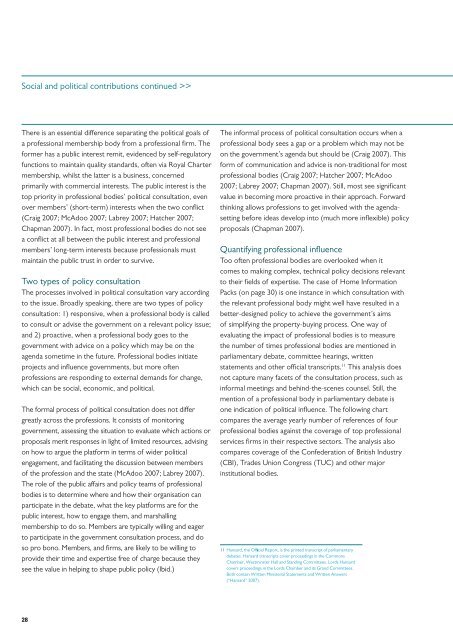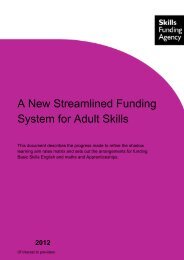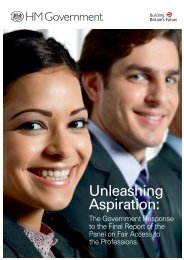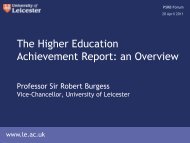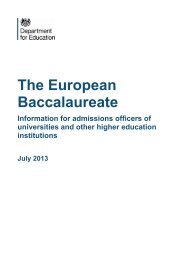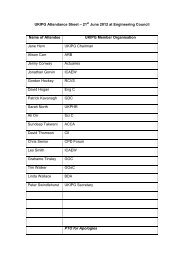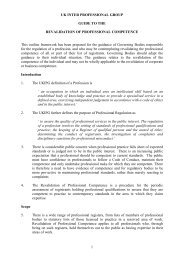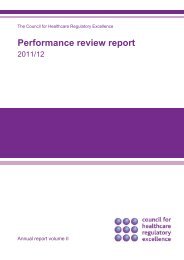BRITISH PROFESSIONS TODAY: THE STATE OF ... - Property Week
BRITISH PROFESSIONS TODAY: THE STATE OF ... - Property Week
BRITISH PROFESSIONS TODAY: THE STATE OF ... - Property Week
You also want an ePaper? Increase the reach of your titles
YUMPU automatically turns print PDFs into web optimized ePapers that Google loves.
Social and political contributions continued >><br />
There is an essential difference separating the political goals of<br />
a professional membership body from a professional firm. The<br />
former has a public interest remit, evidenced by self-regulatory<br />
functions to maintain quality standards, often via Royal Charter<br />
membership, whilst the latter is a business, concerned<br />
primarily with commercial interests. The public interest is the<br />
top priority in professional bodies’ political consultation, even<br />
over members’ (short-term) interests when the two conflict<br />
(Craig 2007; McAdoo 2007; Labrey 2007; Hatcher 2007;<br />
Chapman 2007). In fact, most professional bodies do not see<br />
a conflict at all between the public interest and professional<br />
members’ long-term interests because professionals must<br />
maintain the public trust in order to survive.<br />
Two types of policy consultation<br />
The processes involved in political consultation vary according<br />
to the issue. Broadly speaking, there are two types of policy<br />
consultation: 1) responsive, when a professional body is called<br />
to consult or advise the government on a relevant policy issue;<br />
and 2) proactive, when a professional body goes to the<br />
government with advice on a policy which may be on the<br />
agenda sometime in the future. Professional bodies initiate<br />
projects and influence governments, but more often<br />
professions are responding to external demands for change,<br />
which can be social, economic, and political.<br />
The formal process of political consultation does not differ<br />
greatly across the professions. It consists of monitoring<br />
government, assessing the situation to evaluate which actions or<br />
proposals merit responses in light of limited resources, advising<br />
on how to argue the platform in terms of wider political<br />
engagement, and facilitating the discussion between members<br />
of the profession and the state (McAdoo 2007; Labrey 2007).<br />
The role of the public affairs and policy teams of professional<br />
bodies is to determine where and how their organisation can<br />
participate in the debate, what the key platforms are for the<br />
public interest, how to engage them, and marshalling<br />
membership to do so. Members are typically willing and eager<br />
to participate in the government consultation process, and do<br />
so pro bono. Members, and firms, are likely to be willing to<br />
provide their time and expertise free of charge because they<br />
see the value in helping to shape public policy (Ibid.)<br />
The informal process of political consultation occurs when a<br />
professional body sees a gap or a problem which may not be<br />
on the government’s agenda but should be (Craig 2007). This<br />
form of communication and advice is non-traditional for most<br />
professional bodies (Craig 2007; Hatcher 2007; McAdoo<br />
2007; Labrey 2007; Chapman 2007). Still, most see significant<br />
value in becoming more proactive in their approach. Forward<br />
thinking allows professions to get involved with the agendasetting<br />
before ideas develop into (much more inflexible) policy<br />
proposals (Chapman 2007).<br />
Quantifying professional influence<br />
Too often professional bodies are overlooked when it<br />
comes to making complex, technical policy decisions relevant<br />
to their fields of expertise. The case of Home Information<br />
Packs (on page 30) is one instance in which consultation with<br />
the relevant professional body might well have resulted in a<br />
better-designed policy to achieve the government’s aims<br />
of simplifying the property-buying process. One way of<br />
evaluating the impact of professional bodies is to measure<br />
the number of times professional bodies are mentioned in<br />
parliamentary debate, committee hearings, written<br />
statements and other official transcripts. 11 This analysis does<br />
not capture many facets of the consultation process, such as<br />
informal meetings and behind-the-scenes counsel. Still, the<br />
mention of a professional body in parliamentary debate is<br />
one indication of political influence. The following chart<br />
compares the average yearly number of references of four<br />
professional bodies against the coverage of top professional<br />
services firms in their respective sectors. The analysis also<br />
compares coverage of the Confederation of British Industry<br />
(CBI), Trades Union Congress (TUC) and other major<br />
institutional bodies.<br />
11 Hansard, the Offi cial Report, is the printed transcript of parliamentary<br />
debates. Hansard transcripts cover proceedings in the Commons<br />
Chamber, Westminster Hall and Standing Committees. Lords Hansard<br />
covers proceedings in the Lords Chamber and its Grand Committees.<br />
Both contain Written Ministerial Statements and Written Answers<br />
(“Hansard” 2007).<br />
28


